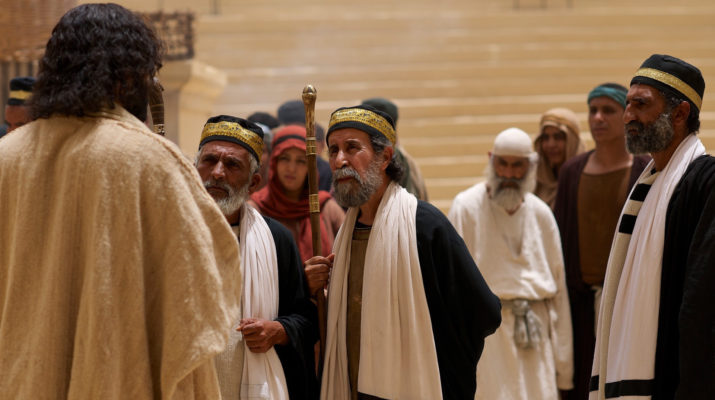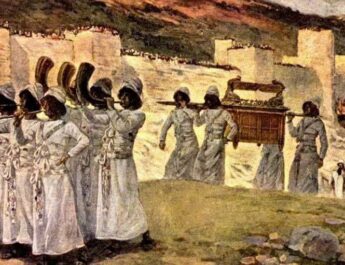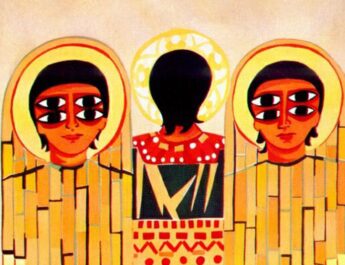Luke 20:27-38
Ordinary C50
27 Some Sadducees,A those who say there is noB resurrection,C cameD to him
A “Sadducees” = Saddoukaios. 14x in NT. Probably from Hebrew tsadoq (Zadok, a personal name); from tsadaq (to be just or righteous, do justice); from tsedeq (rightness, righteousness, just cause, vindication; that which is right in a natural, moral, or legal sense; abstractly equity; figuratively prosperity). This is a Sadducee. Whereas the Sadducees were part of the priestly line and inherited their religious position and responsibilities, Pharisees were regular people who studied the scriptures and offered guidance to regular folk. Sadducees were often wealthier and willing to sacrifice their identity to rub elbows with Roman society. Pharisees were often more concerned with what it meant to follow God without compromising what made them different as followers of God. Sadducees primarily believed in that which was written down (the first five books of the Bible) and Pharisees believed in the Bible and the traditions of the elders.
B “say…no” = antilego. 11x in NT. From anti (opposite, instead of, against) + lego (to speak, tell, mention). This is literally to speak against – so, to contradict, oppose, resist. It is being argumentative, especially with a hostile bent through opposition. It can indicate attempts to thwart.
C “resurrection” = anastasis. From anistemi (to raise up, rise, appear; to stand up literally or figuratively. Can also mean to resurrect); from ana (upwards, up, again, back, anew) + histemi (to make to stand, place, set up, establish, appoint, stand by, stand still, stand ready, stand firm, be steadfast). This is literally standing up or standing again. It is used figuratively for recovering a spiritual truth. It can be raising up, rising, or resurrection.
D “came” = proserchomai. From pros (for, at, towards) + erchomai (to come, go). This is to approach, draw near, come up to. It is also used figuratively to mean worship.
28 and asked him a question:E “Teacher,F MosesG wroteH for us
E “asked…a question” = eperotao…lego. Eperotao is from epi (on, upon, against, what is fitting) + erotao (asking a question or making an earnest request; used when one anticipates special consideration for their request); {from eromai (to ask) OR from ereo (to say, tell, call, speak of)}. This is to question, interrogate, seek, or demand. The questioner is at an advantage – in a preferred position when they make their question. Lego is related to “say…no” in v27. See note B above.
F “Teacher” = Didaskalos. From didasko (to teach, direct, instruct, or impart knowledge; in the New Testament, almost always used for teaching scripture); from dao (to learn). This is teacher or master.
G “Moses” = Mouses. From Hebrew Mosheh (Moses); from mashah (to pull out in a literal or figurative sense, to draw out) OR from Egyptian mes or mesu (child, son i.e. child of…). This is Moses – the one drawn out from the water, which is to say, rescued. If derived from the Egyptian, his name would share a root with Rameses and Thutmose.
H “wrote” = grapho. This is to write or describe. It is where the word “graphic” comes from.
that if a man’s brotherI diesJ leavingK a wifeL but no children,M
I “brother” = adelphos. From a (with, community, fellowship) + delphus (womb). This is a brother in a literal or figurative sense. It is also used of another member of the Church.
J “dies” = apothnesko. From apo (from, away from) + thnesko (to die, be dead). This is to die off. It is death with an emphasis on the way that death separates. It can also mean to wither or decay.
K “leaving” = echo. This is to have, hold, possess.
L “wife” = gune. Perhaps from ginomai (to come into being, to happen, become, be born; to emerge from one state or condition to another; this is coming into being with the sense of movement or growth). This is woman, wife, or bride. This is where the word “gynecologist” comes from.
M “no children” = ateknos. 3x in NT – all in Luke 20. From a (not, without) + teknon (child, descendant, or inhabitant); {from tikto (to beget, bring forth, produce)}. This is without children.
the man shall marryN the widowO and raise upP childrenQ for his brother.
N “marry” = lambano. It does not refer to passive receiving of something, but active acceptance or taking of something whether it is offered or simply nearby. It focuses on individual decision and action.
O “widow” = ho + adelphos + autos + ho + gune. Literally, “the wife of his brother.” Adelphos is the same as “brother” in v28. See note I above. Gune is the same as “wife” in v28. See note L above.
P “raise up” = exanistemi. Related to “resurrection” in v27. 3x in NT. From ek (from, from out of) + anistemi (to raise up, rise, appear; to stand up literally or figuratively. Can also mean to resurrect); {from ana (upwards, up, again, back, anew) + histemi (see note C above)}. This is to raise up, stand, produce, beget.
Q “children” = sperma. From speiro (to sow seed, spread, scatter); perhaps from spao (to pull, to draw a sword). This is something sown so it could be seed or offspring and descendants. This is where the word “sperm” comes from.
29 Now there were sevenR brothers; the firstS married a womanT and died childless; 30 then the secondU, V
R “seven” = hepta. This is seven or seventh. Figuratively, seven is the number of completeness or perfection.
S “first” = protos. From pro (before, first, in front of, earlier). This is what is first, which could be the most important, the first in order, the main one, the chief.
T “woman” = gune. Same as “wife” in v28. See note L above.
U “second” = deuteros. From duo (two, both). This is second, twice, again. It is part of where “Deuteronomy” comes from, which means “second law” or “a repetition of the law.” See https://en.wiktionary.org/wiki/Deuteronomy
V Some manuscripts add “the woman and this one died childless” = ho + gune + kai + houtos + apothnesko + atkenos. Gune is the same as “wife” in v28. See note L above. Apothnesko is the same as “dies” in v28. See note J above. Ateknos is the same as “no children” in v28. See note M above.
31 and the thirdW married her, and so in the same way all seven died childless.X 32 FinallyY the woman also died. 33 In the resurrection, therefore, whose wife will the woman be?Z For the seven had married her.”AA
W “third” = tritos. From treis (three). This is third.
X “childless” = ou + kataleipo + teknon. Literally, “did not leave children.” Kataleipo is Teknon is related to “no children” in v28. See note M above.
Y “finally” = husteron. 11x in NT. From husteros (last, later); from hupo (by, under, about, subordinate to). This is afterwards, eventually, lastly.
Z “be” = ginomai. Related to “wife” in v28. See note L above.
AA “had married her” = echo + autos + gune. Literally, “had her as wife.” Echo is the same as “leaving” in v28. See note K above. Gune is the same as “wife” in v28. See note L above.
34 JesusBB said to them, “Those who belongCC to this ageDD marryEE and are given in marriage,FF
BB “Jesus” = Iesous. From Hebrew Yehoshua (Joshua, the Lord is salvation); {from YHVH (proper name of the God of Israel; the self-existent and eternal one); {from havah (to become) or from hayah (to come to pass, become, be)} + yasha (to deliver, defend, help, preserve, rescue; properly, to be open, wide or free, which implies being safe. So, in a causative sense, this is to free someone)}. This is Jesus or Joshua in Greek – the Lord saves or the Lord is salvation.
CC “those who belong” = ho + huios. Literally, “the sons of.” Huios is son, descendant – a son whether natural born or adopted. It can be used figuratively for other forms of kinship.
DD “age” = aion. From the same as aei (ever, always, unceasingly, perpetually; on every occasion). This is an age, cycle of time, course, continued duration. It is also used to describe the eternal or forever. This is the word used to discuss the present age or the messianic age.
EE “marry” = gameo. From gamos (a wedding, whether the ceremony, the feast, or the marriage itself). This is to marry.
FF “given in marriage” = gamisko. Related to “marry” in v34. 8x in NT. From gamos (see note EE above). This is to give in marriage – specifically give a daughter.
35 but those who are considered worthyGG of a place in that ageHH and in the resurrection from the deadII neither marry nor are given in marriage.
GG “considered worthy” = kataxioo. 3x in NT. From kata (down, against, according to) + axioo (to consider worthy, deserve, see something as good); {from axios (related to weight or worth – deserving, suitable, corresponding, due reward); from ago (to lead, bring, carry, guide, drive, go)}. This is to consider or make worthy. Properly, to assess something as worthy, weighing out its precise value.
HH {untranslated} = tugchano. 12x in NT. Root means to become ready. This word is to hit, meet, happen, obtain, chance, perhaps. Properly, it means to hit the mark or be spot on. Thus, it is the opposite of the Greek word for sin hamartano, which literally means to miss the mark.
II “dead” = nekros. Perhaps from nekus (corpse). This is dead or lifeless, mortal, corpse. It can also be used figuratively for powerless or ineffective. It is where the word “necrotic” comes from.
36 Indeed, they cannotJJ die anymore, because they are like angelsKK and are childrenLL of God,MM being children of the resurrection.
JJ “cannot” = dunamai. This is to be able, or something that is possible. It can also be empowered or being powerful. The Greek word for “miracle” (dunamis) comes from this root.
KK “like angels” = isaggelos. Related to “considered worthy” in v35. 1x in NT. From isos (equal, same, similar, consistent); {perhaps from eido (to know, remember, perceive – to see and so understand)} + aggelos (angel, messenger; a messenger from God bringing news – whether a prophet or an angel); {from aggellos (to bring tidings); probably from ago (see note GG above)}. This is angelic, equivalent to angels.
LL “children” = huios. Same as “those who belong” in v34. See note CC above.
MM “God” = Theos. From Proto-Indo-European origins, meaning do, put, place. This is God or a god in general.
37 And the fact that the dead are raisedNN Moses himself showed,OO in the story about the bush,PP where he speaksQQ of the LordRR
NN “are raised” = egeiro. This is to awake, raise up or lift up. It can be to get up from sitting or lying down, to get up from sleeping, to rise from a disease or from death. Figuratively, it can be rising from inactivity or from ruins.
OO “showed” = menuo. 4x in NT. Perhaps from mnaomai (to remember; by implication give reward or consequence); perhaps from meno (to stay, abide, wait, endure). OR from massaomai (to chew, gnaw); from masso (to knead, squeeze) OR from mao (to strive). This is to show, inform, reveal, report. It is to disclose in a legal setting. It implies mental effort.
PP “bush” = batos. 5x in NT– 4x of the burning bush & 1x of a bramble bush. This is a bush, perhaps a thorn bush.
QQ “speaks” = lego. Same as “asked…a question” in v28. See note E above.
RR “Lord” = Kurios. From kuros (authority, supremacy). This is a respectful address meaning master or sir. It refers to one who has control or power greater than one’s own. So, it was also applied to God and Jesus as Master or Lord.
as the God of Abraham,SS the God of Isaac,TT and the God of Jacob.UU 38 Now he is God not of the dead but of the living,VV for to him all of them are alive.”WW
SS “Abraham” = Abraam. From Hebrew Abraham (exalted father); from the same as Abiram (exalted father, a high father – lofty) {from ab (father literal or figurative) + rum (rise, bring up, being high, extol, exalt, haughty; to raise in a literal or figurative sense)}. This is Abraham, father of many nations or father of a multitude.
TT “Isaac” = Isaak. From Hebrew yitschaq (Isaac, “he laughs”); from tsachaq (to laugh, mock, play, make sport; this is laughing out loud whether in joy or in a scornful way). Isaac, meaning “he laughs.”
UU “Jacob” = Iakob. From Hebrew Yaaqob (Jacob); from the same as aqeb (heel, hind part, hoof, rear guard of an army, one who lies in wait, usurper). This is James, meaning heel grabber or usurper.
VV “living” = zao. This is to live literally or figuratively. It is used for life including the vitality of humans, plants, and animals – it is life physical and spiritual and life everlasting.
WW “are alive” = zao. Same as “living” in v38. See note VV above.
Image credit: “Question about Jesus’ Authority” by LUMO Project.




